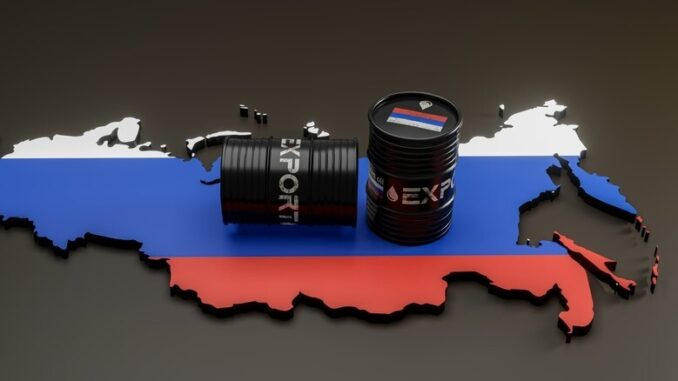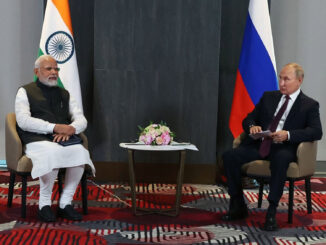
Russia stunned global oil markets Thursday by announcing a temporary ban on exports of gasoline and diesel starting Sep. 21, in a bid by Moscow to stabilize volatile prices and supplies on the domestic market.
The move will effectively remove 1 million barrels per day of motor fuel exports — 80% of which is diesel — and further choke global diesel markets. European gasoil prices rose 2% to nearly $1,000 per metric ton on the news.
A government resolution signed by Prime Minister Mikhail Mishustin stated that the temporary measure would help saturate the local motor fuel market and lead to lower prices for consumers. The resolution did not say how long the ban would last.
The surprise decision fueled speculation in the West that Moscow was “weaponizing” oil in retaliation for punishing Western sanctions — as a way of harming US and European economies by fueling inflationary risks, and potentially influencing next year’s US presidential election.
Moscow’s success in helping raise oil prices since May, while trimming the discount on its own barrels, by cutting crude production and exports in cooperation with Opec-plus may also have influenced its thinking in approving an outright product export ban.
However, there were very real and direct domestic reasons for the drastic measure, namely an intensifying crisis on the domestic fuel market, where prices have soared to record highs, supplies have failed to reach key consumers such as agricultural workers, and tax fraud has proliferated.
To resolve the crisis, the government in recent weeks has considered licensing exporters, establishing production and export quotas and imposing a hefty export duty on petroleum products.
But these measures posed a challenge in administration, analysts said, while a temporary export ban offered a quick, sure-fire solution — and one that would force oil companies to be more amenable at the negotiating table.
Domestic Crunch
Soaring motor-fuel prices and tight supplies in Russia over the past three months have triggered a tsunami of complaints from citizens and state officials. The crisis was triggered by high global prices that sucked volumes from the local market, heavy refinery maintenance and regional shortages and was exacerbated by a recent change in subsidies that made exports even more attractive.
President Vladimir Putin was forced to chime in recently and pressed the state and oil companies to find a compromise.
On Wednesday, First Deputy Energy Minister Pavel Sorokin received a thrashing in the lower house of the parliament over the record-high prices for oil products, which have slammed farmers in southern regions, for example.
Russian analysts agree that in the short-term, the ban will boost domestic supplies. However, most do not expect it to last until year’s end, as neither the government nor oil companies would benefit from a prolonged embargo.
A domestic glut of gasoline and diesel could force adjustments in refinery operations, with more naphtha and other gasoil produced instead. Russian refineries already export naphtha at a loss.
The government, meanwhile, will receive less taxes from oil product exports and may face financial obligations from larger volumes of domestic motor fuel supplies, which are supported by a large subsidy. A lack of storage means oil companies will face limits on the amount of non-exported diesel that can be stored at home.
Tough Measures
Deputy Prime Minister Alexander Novak, who oversees the country’s energy industry, said Wednesday that the government was ready to take tough measures to balance the products situation.
He insisted there was no deficit in supplies and the problem was with pricing in the wholesale market. In July and August, Russia’s railroads proved unable to cope with the large volume of cargoes, which included supplies to the war in Ukraine and summer vacationers, while refinery maintenance also removed much-needed capacity.
These issues have since been solved, Novak told reporters on the sidelines of an industry conference in Tyumen.
He stressed that higher oil product prices globally, as well as the ruble’s devaluation, compounded problems, since higher export netbacks led some traders to start buying cheap products on the domestic market and send them abroad.
In western Russia, a barrel of diesel sells for about $100, while the same barrel could net around $12 more when exported, even after transportation costs and export duties.
Globally, diesel markets have rallied in recent months after Opec-plus production cuts tightened supplies of medium, sour crude grades ideally suited to produce diesel, while summer demand proved to be robust and helped drain inventories.
Russia is a heavyweight diesel producer, cranking out 1.83 million b/d in January-August this year. Exports over the same period averaged 785,000 b/d, according to Energy Intelligence data.
Europe used to soak up about 80% of Russia’s diesel exports, but imposed an embargo on product imports in February. These volumes are now shipped to Turkey, Brazil and a handful of African and Middle East countries, which will now have to source supplies elsewhere.
On average Russia exports only about 15% of its gasoline output, or around 150,000 b/d. These volumes are seen as less critical to global markets.
Novak is to hold a meeting with oil companies on Friday to discuss the issue.



